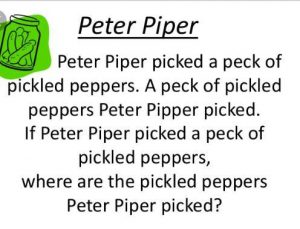
Peter Piper Picked a Peck of Pickled Peppers.
The tongue twister is originally thought to be published in 1813 in London; however, it is believed to have been around for a least a generation prior. It is a children’s nursery rhyme and tongue twister. Tongue twisters are short poems or sayings that can be used to practice pronunciation. When it was first published in Peter Piper’s Practical Principles of Plain and Perfect Pronunciation by John Harris it was thought to improve the speech and pronunciation of the its readers. The text was a children’s alphabet book. Each letter in the alphabet was accompanied by an illustration and tongue twister that began with the assigned letter.
A Peck of Pickled Peppers Pierre Poivre Picked
Peter Piper was actually Pierre Poivre, a french botanist and horticulturalist born in Lyon, France in 1719. His name was made more English sounding by the British first. Originally, he was a missionary in East Asia among the French colonial islands.
Missionary turned Pirate
Even though Pierre was a plant expert and missionary, he became well known for stealing spices from Dutch traders. He would steal the spices and then use them to grow more spices in his own garden to sell at a more reasonable price to the average European colonists. At the time pepper was the term used for all spices. So even though the tongue twister says he picked a peck of peppers. The peppers could really be anything from nutmeg to cinnamon.
If Pierre Picked a Peck of pickled Peppers
A peck is a customary unit of dry volume. A peck is a fourth of a bushel, 2 dry gallons, 8 dry quarts, or 16 dry pints. Some produce such as apples can still be sold by the peck. Now peppers are sold by the pound in the US.
Where’s the Peck of Pickled Peppers Pierre Picked?
Unfortunately, the spice trading companies were smart enough to keep their spices from being stolen or bought and then used to grow more spices or peppers. This would have increased the supply of spices and lowered the price. The spice trade was carefully controlled to maximize profits. They would “pickle” their spices by rubbing them with lime. The lime would keep the spices from germinating. The spices they sold would not grow more spices. This would keep the supply of spices low and keep people buying spices for a higher price.
Today you can find the old tongue twister in children’s books and nursery rhymes. It may be used as a way to learn about the sound of the letter P or as just a fun poem. Students of all ages still enjoy trying our a good tongue twister with their friends. Many kids will compete to say a tongue twister faster and better than a peer.